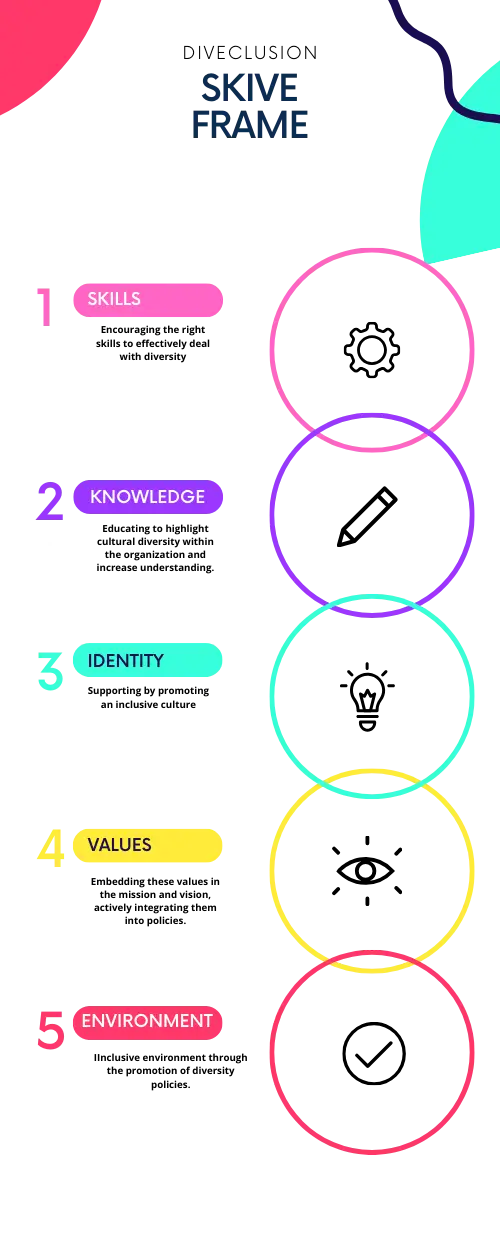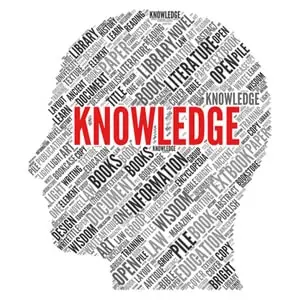Diveclusion develops, facilitates, and provides training, workshops, challenges, and coaching sessions for organizations. We do this using the proven SKIVE framework (Skills, Knowledge, Identity, Values, Environment) as the cornerstone of our approach. This not only offers a structured approach but also enables us to guide organizations comprehensively in developing an inclusive culture.
Our training sessions and challenges are infused with the SKIVE method to equip participants with the necessary skills, knowledge, identity awareness, core values, and an environment that embraces diversity and inclusion. From workshops to challenging programs, each initiative is designed to empower participants personally and organizationally, enabling them to confidently and empathetically lead and support diverse teams in inclusive practices.
Diveclusion’s approach provides:
Aspects that organizations can implement to create an environment where every voice is heard, respected, and valued, and where diversity is celebrated as an engine for growth and innovation.

Everything you think about someone else actually says a lot about yourself. It speaks about where you come from, what you’ve experienced, your own rules, things you value, and your tastes. In short, it says a lot about the things you’ve learned and carried into your life.
On a personal level, it’s about enhancing your social skills, such as showing understanding, communicating well, and dealing with conflicts. Companies can encourage this by offering training and workshops aimed at improving everyone’s ability to handle diversity effectively.


When we first meet someone, we usually form judgments quickly. That’s very normal! Everyone does that. We don’t really think about it and don’t ask ourselves questions about it. But where do those thoughts actually come from? And what do we miss if we don’t look beyond that first impression?
On a personal level, this means learning more about different cultures, traditions, and backgrounds, so that you develop a greater understanding and respect for diversity. Companies can promote this by offering educational programs that emphasize cultural diversity within the company and foster understanding.
Who are you? How do you see yourself? Your background, experiences, culture, and how you perceive yourself are the things that make you who you are. Simply put, identity is about your personal style, your roots, and the things that shape who you are. It’s important because it determines how you see others and how you connect with the world around you.
On a personal level, this means acknowledging everyone’s unique identity and appreciating diversity within a group. Companies can encourage this by creating a culture where all identities are valued and respected, without biases or discrimination.


Values are the things that truly matter to you. They are the ideas and principles that guide you and determine how you approach things and make decisions. Think of honesty, respect, equality, or freedom. Values act as your life guide; they show what you genuinely care about and stand for. Put simply, values are like the rules you follow, your inner GPS that guides you in making choices and shaping your behavior. They influence how you interact with others and how you respond in different situations.
On a personal level, it’s about identifying and embracing values that promote inclusion, such as respect, equality, and justice. Companies can embed these values into their mission and vision, actively incorporating them into policies and day-to-day operations.
What are the physical, social, and emotional conditions in which we work, learn, or live? An inclusive environment is one where everyone feels welcome, safe, and respected, regardless of background or identity. Put informally, the environment is the vibe and atmosphere we find ourselves in – a place where everyone can be themselves and where diversity is valued. It’s the setting that determines how we interact and collaborate with each other.
On a personal level, this involves creating a setting where everyone, no matter who they are, feels safe, supported, and included. Companies can achieve this by promoting diversity policies, providing equal opportunities, and fostering a culture where everyone feels at home and can fully participate.

Based in Amsterdam, but providing our services throughout the Netherlands
Phone: +316 16 883 475
Email: [email protected]
Would you like to work with us as a consultant or trainer? Please contact us.
A short description introducing visitors to your business and the services you offer


Use this section to describe your company and the services you offer. You could share your company’s story and details about why you are in business. The goal is to create a connection with the visitor and give them confidence to work with you.
This text briefly introduces visitors to your main services.

A short description of the service and how the visitor will benefit from it.

A short description of the service and how the visitor will benefit from it.

A short description of the service and how the visitor will benefit from it.

A short description of the service and how the visitor will benefit from it.
A short description of the benefit.
A short description of the benefit.
A short description of the benefit.
A short description of the benefit.




This is your chance to emphasize why the visitor should contact you right now.
© 2025 All Rights Reserved.